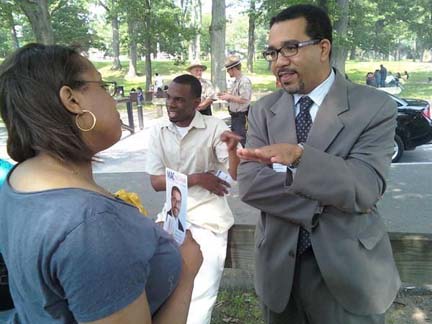September 8, 2010
 Mac D’Alessandro on the stump in Franklin ParkStanding the doorway of her Romsey St. home, Mariama White-Hammond concedes she’s had some “ups and downs” with her U.S. Congressman, Stephen Lynch.
Mac D’Alessandro on the stump in Franklin ParkStanding the doorway of her Romsey St. home, Mariama White-Hammond concedes she’s had some “ups and downs” with her U.S. Congressman, Stephen Lynch.
He voted against the original health care reform bill earlier this year and for the war in Iraq, departing from the state’s Democratic delegation, she’s reminded.
“And he’s been like that from the beginning,” she says.
She then takes another look at the campaign literature Lynch’s Democratic primary opponent, Mac D’Alessandro, has handed her.
“I’ll definitely read up,” she says.
D’Alessandro steps off the porch and marks her down on his list of likely Democratic primary voters: She’s a number two. A leaner.
It’s one of the more receptive responses he received as the Milton Democrat knocked on doors in Columbia-Savin Hill in the middle of Labor Day weekend. The homes he hit that Sunday evening are in Lynch’s old state Senate district, which the South Boston Democrat represented before taking the Ninth Congressional seat in a 2001 special election.
The winner of the Democratic primary squares off with Keith Lepor, a war photojournalist, or Braintree resident Vernon Harrison, and independent candidate Phil Dunkelbarger. Lepor and Harrison are running in a Republican primary scheduled the same day as the Democratic primary, Sept. 14.
D’Alessandro, the regional political director for the Service Employees International Union, calls his face-off with Lynch “the most important race in the country.” Told that several Democrats, including Nevada Sen. Harry Reid, might take issue with that assessment, D’Alessandro says Democrats must be held accountable for so-called bad votes, particularly in safely Democratic districts such as the Ninth Congressional. The district includes Milton, Needham, Randolph and West Bridgewater, among others.
“This is the last primary challenge in the country to a Democrat who voted against health care reform,” he says.
But Lynch, a floor whip for U.S. House Speaker Nancy Pelosi and widely considered the conservative amongst the Bay State’s liberal D.C. delegation, has caught flack from the right as well as the left: In a release blasted out to reporters last week, the state Republican Party referred to Lynch as Pelosi’s “lap dog,” arguing that he voted with Democrats 98 percent of the time.
And in a cheeky mailing from the D’Alessandro camp last week, Lynch was compared to Benedict Arnold, who decamped to the British side in the Revolutionary War, and Johnny Damon, who left the Red Sox for the Yankees. (D’Alessandro supporters have also ribbed Lynch for having “Coming Soon” up on the “Issues” section of his campaign website.)
“Let’s drop the labels for a moment,” D’Alessandro says. He ticked off a list of benefits that come with the health care reform law, including 32 million Americans receiving expanded care and insurance companies being barred from denying coverage to children because of pre-existing conditions.
“It was the right thing to do to support this law,” he said.
Lynch, of course, disagrees, saying the final bill had unseemly backroom deals, gave the pharmaceutical industry and trial lawyers a pass, and the “worst part of it” was a tax on the value of high-cost health care coverage, also known as “Cadillac” plans.
That last part drew concerned murmurs in the community room of Keystone Apartments last week. A friendly crowd of about 60 seniors - from Lower Mills, Ashmont, Savin Hill and Adams Corner – had gathered to hear Lynch speak and explain why he voted against the final bill but for follow-up legislation intended to “fix” it.
The tax won’t go into effect until 2018, Lynch said, adding that neither President Barack Obama nor Pelosi were likely to be around by then. “They won’t be accountable for the stuff they put in this bill,” he said.
Asked by one senior if he supports a repeal of the bill, Lynch called it a “colossal waste of time.” “We do not have the two-thirds votes to overturn this thing,” he said. And he predicted an effort by some states to sue the federal government over the constitutionality of the bill would fail. “I would not bet on the success of those eight states,” he said. “I don’t think it holds water.”
Lynch said when he spoke with Obama, he told the president that if the bill passes, he would attempt to fix it “because we still need health care reform.”
Getting fixes through would be difficult he added, because of the expanded number of seats Republicans are expected to take. Lynch predicted Democrats could lose 30 U.S. House seats – he later added Democrats might lose control of the House completely, which means Republicans would end up taking 39 seats – and Republicans could gain between three and four seats in the Senate, but fall short of the needed number to take control of that chamber.
Lynch spoke for 90 minutes, after which several of the seniors lined up to personally speak with him as his campaign photographer snapped away.
Peggy Anne Canty, a 65-year-old former nurse living at the apartment complex, had attended a similar, smaller forum held by the D’Alessandro campaign 24 hours earlier at the same location. “When people are new at things, you just don’t have that finish,” she said, before turning back to the subject of Lynch.
“People have known Stevie Lynch for years,” Canty added. “He’s doing a good job.”
Topics:
Tags:



